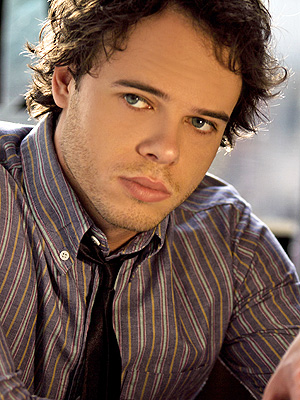By PEOPLE TV Critic Tom Gliatto
02/25/2013 at 10:30 AM EST
Hosting the Oscars, they say, is a thankless job. So, Seth MacFarlane, thanks for nothing.
This isn't to say he can be blamed for a long evening that seemed to be devoted more to singing than handing out awards.
On the other hand, he doesn't get credit for the show's best moments, either: Adele's powerful performance of "Skyfall," Daniel Day-Lewis's charmingly stiff humor in his acceptance speech for Lincoln – it was so like Abe! – or Michelle Obama's surprising and generous gesture: appearing via satellite to announce the Best Picture winner.
It's also only fair to say that this year's awards weren't as awful as the ones hosted in 2011 by James Franco and Anne Hathaway (her Supporting Actress award for Les Misérables, I suspect, was not only because she made "I Dreamed a Dream" look as painful as a birth scene from Alien, but for being such a good sport about that hosting fiasco). And, given the caliber and popularity of the movies nominated, ratings should be good.
But it's the host who sets the tone, and in that regard MacFarlane was problematic. I say "problematic" in the way that a Secretary of State might describe a report that North Korea had fired a missile in our direction.
The creator-writer of Fox's Family Guy and the hit film Ted, MacFarlane was brought in as a calculated, possibly desperate gamble to liven up the broadcast. He's certainly famous enough, but he's still known principally as a comic sensibility – a voice actor, a joke teller, a writer-director – than as a personality or performer.
And that sensibility is impossible to be indifferent to. MacFarlane likes to be politically and culturally incorrect in a way that registers as annoying, well-aimed tweaks. His jokes can feel like a pencil poked in your back by a student behind you in sixth grade.
I just experienced a most painful flashback to just such an incident.
Maybe the Academy was sold by the fact that, unlike Ricky Gervais and his unnerving, shiny face, MacFarlane looks so harmless, so completely host-appropriate. He arrives as an impeccably groomed package, as smiling and smoothly spoken as Ryan Seacrest. He looks as if he might have managed the Jonas Brothers. He can also sing in the lightly swinging style of classic crooners like Sinatra.
The incongruity doesn't make him funnier.
Why The Funny Man Wasn't So Funny
The night started with one of the strangest and ultimately most pointless openings ever. William Shatner, looking rumpled and cross in his old
Star Trek uniform, appeared on a giant screen. He said he had come from the future to warn MacFarlane that his show would be a disaster: "Your jokes are tasteless and inappropriate and everyone ends up hating you."
Then he showed a clip from "further on" in the broadcast: MacFarlane was singing (quite well) about actresses' exposed breasts. Then we saw MacFarlane's "sock puppet" adaptation of the Denzel Washington movie Flight. Shatner said he was appalled that MacFarlane would have the nerve to sock-impersonate a black actor.
In other words, MacFarlane had to explain to us that he would be offensive – because people weren't able to tell? – before he could actually be offensive. This wasn't not so much offensive as irritating and self-aggrandizing.
I actually would have been grateful to be shocked, angered or disgusted rather than patronized.
I mean, it's the Academy Awards, a night that often feels like Hollywood's idea of America's idea of heaven.
This happened to me only once. The "playing off" music – for winners who spoke too long – was the theme from Jaws. This seemed, for a moment, like an inspired, even cute idea, until you realized it came across as sniggering at the statuette-holders as they struggled to cram all they could into their moment of glory. It was like a whoopie cushion, or a wind instrument going "wha-wha-wha-WHAAAA."
(By the time Quentin Tarantino accepted his screenwriter award for Django Unchained with a very long, wildly emphatic speech, Jaws was gone.)
Beyond that, MacFarlane kept throwing out lines, as hosts do, delivering them with a Johnny Carson urbanity even when he was joking, for instance, about how many years it will be before 9-year-old Quvenzhané Wallis can hook up with (or, more precisely, will be too old for) George Clooney.
Then, with all the statuettes given out and the time on the cable box indicating a few minutes past 12 a.m., he and Kristin Chenowith performed a number called "Here's to the Losers."
In a nutshell.










